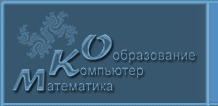|
|
Архив публикацийТезисыXIV-ая конференцияСосуществование аттракторов как следствие биологической инвазии. Математическое моделирование динамики озерного сообщества оз. СямозероИнститут теоретической и экспериментальной биофизики РАН, Россия, 142290, г. Пущино, Московская область, ул. Институтская д.3, тел.: (4967)739157, email: medvinsky@iteb.ru, mgmaria@yandex.ru 1Биологический факультет Московского государственного университета им. М.В. Ломоносова, Россия, 119992, г. Москва, ГСП-2, Ленинские горы, МГУ, биологический факультет, тел.: (095)939-36-57 2Институт проблем экологии и эволюции им. А.Н. Северцова РАН, Россия, 119071, г. Москва, В-71, Ленинский проспект д. 33 3Институт исследований окружающей среды, Германия, 49069, г. Оснабрюк. 4Университет Калифорнии, Риверсайд, Калифорния, США 5Институт биологии КНЦ РАН Россия, 185610, Карелия, г. Петрозаводск, ул. Пушкинская, д.11
В данной работе мы продолжаем исследование модели, прототипом которой является рыбное население оз. Сямозеро (Карелия). В настоящей работе представлена математическая модель динамики пространственно гетерогенной популяционной системы типа «хищник – жертва». Исследуется динамика сообщества под влиянием инвазии вселенца, промежуточного хищника. Представленные в работе результаты демонстрируют, что инвазия постороннего вида может приводить к существенным изменениям в динамике рыбного сообщества. Показано, что могут возникать хаотические колебания плотности рыбных популяций. Особый интерес представляет возможность сосуществования различных аттракторов. Проведенный нами анализ выявил возможность сосуществования следующих видов аттракторов: хаотические колебания плотности рыбных популяций, нехаотическое колебания плотности рыбных популяций и стационарный режим. При этом «выбор» того или иного режима зависит от начальной плотности вселенца. Кроме того, показано, что успешная биологическая инвазия может иметь место только в отсутствие конкуренции между молодью вселенца (промежуточного хищника) и популяцией мирной рыбы (жертвы) за общий питательный ресурс. |

